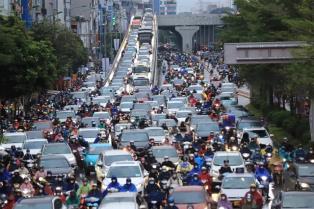The decree aims to help enterprises in the domestic automobile manufacturing industry who are faced with high surplus inventory alongside reduced access to capital, high interest rates, changes in exchange rates, and inflation.

Cars will enjoy a 50 per cent cut in registration fees from July 1 after Deputy Prime Minister Le Minh Khai on June 28 signed a decree on registration fee reduction for domestically manufactured and assembled automobiles.
The decree was made based on a proposal by the Ministry of Finance, which was put in charge of a coordinated effort across ministries to realise the cut, active from July 1 to December 31.
From January 1, 2024, the registration fee will continue to be governed by Decree 10/2022/ND-CP and current resolutions of the Provincial/Municipal People's Councils or decisions of the Provincial/Municipal People's Committees on registration fee rates in localities.
The decree aims to help enterprises in the domestic automobile manufacturing industry that are faced with high surplus inventory alongside reduced access to capital, high interest rates, changes in exchange rates, and inflation.
The Vietnam Automobile Manufacturers Association (VAMA), the Vietnam Association of Mechanical Enterprises (VAMI), and the People’s Committees of Quang Nam and Ninh Binh provinces had sent a letter to the Prime Minister and the Ministry of Industry and Trade, as well as the Ministry of Finance, and relevant agencies, in which they made recommendations and proposals to stimulate demand.
The Vietnam Automobile Importers Association (VIVA) also submitted a petition to the National Assembly, the Ministry of Industry and Trade, the Ministry of Finance, and the Government Office, suggesting preferential registration fee rates for imported cars.
According to the Ministry of Finance, a 50 per cent reduction in fees for domestically manufactured cars could lead to an increase in sales volume and, consequently, an increase in VAT and excise tax revenues. But the main collectors of these taxes are 8 specific localities where manufacturing and assembly companies are located, including Vinh Phuc, Hai Duong, Hai Phong, Ninh Binh, Da Nang, Quang Nam, Binh Duong, and HCM City.
According to a report by the Vietnam Automobile Manufacturers Association (VAMA), the total car sales in the market reached 92,801 units of all types in the first four months 2023, a 30 per cent drop compared to the same period last year. Dealers have consistently offered promotions to boost purchase demand, but the impact has not been as desired.
The sales volume of domestically assembled cars reached 50,017 units, a 39 per cent decrease compared to the same period last year. Sales of imported cars were also lower by 16 per cent compared to the first four months of 2022, reaching only 42,784 units by the end of the second quarter. In May alone, car sales including imported cars of non-VAMA manufactured sales were down 52.7 per cent year-on-year to 20,726 units in May. Cumulative sales for the first 5 months of this year were down 35.7 per cent year-on-year to 113,527 units.
The weakened purchasing power of the market is believed to be one of the reasons affecting both domestic car production and the importation of entirely built vehicles from abroad in recent months.
Previously, the Government applied the same registration fee reduction for domestically assembled cars in 2021 and 2022 as a measure to support the recovery of industrial enterprises affected by the COVID-19 pandemic.
According to the Ministry of Finance, the continued registration fee reduction will have positive impacts on consumers, domestic automobile manufacturers and assemblers and socioeconomic performance. However, the revenue of the State Budget could reduce by VND8-9 trillion (US$340-$382 million) due to the registration fee reduction.
While the cut could help the automobile industry in the short-term, it also poses a risk to localities' fiscal balance and the central government budget.
In addition, it could negatively impact the country's commitments as a member of various international trade organisations and Free Trade Agreements (FTAs) as the cut only applies to domestically manufactured and assembled cars.
In 2020 and 2022 the demand for automobiles remained high, unaffected by inflation. The 50 per cent cut in registration fees encouraged manufacturers and distributors to resume supply chains to meet the demand. As a result, the State budget revenue from special consumption tax and VAT offset the policy-driven reduction in registration fee revenue. — VNS





